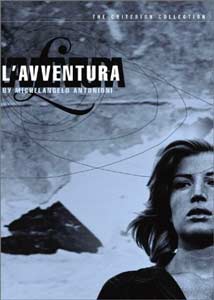
(Directed by Michelangelo Antonioni, 1960, Italy)
L'Avventura continues to have a polarizing effect on viewers since its premiere at the Cannes Film Festival 47 years ago: either you like Antonioni's masterpiece or you don't. On the internet movie database page for this film, the plot keywords give it all: unsolved mystery, very little dialogue (a personal favorite), island, missing person, human relationship (perhaps in the plural?) and realization. All of these generalizations just scream out: art house film.
Yes, socialite Anna (Lea Massari) disappears within the first half hour of the film while visiting an island on a cruise with her upper class friends, among them: her fiance Sandro (Gabriele Ferzetti) and her best girlfriend Claudia (Monica Vitti). Her disappearance is never explained, it just happens. Sandro and Claudia remain on the island in an attempt to find her, searching false leads in town; eventually Sandro makes a play for her, Claudia is guilty, and after rejecting Sandro, she decides to be in a relationship with Sandro, he is caught 'in flagrante delicto' by Claudia, and she forgives him.
This synopsis is comically inept, deliberately so (like the plot keywords quoted above). This film is a journey as the title implies, the viewer is along for the ride, as narrative disappears like Anna and Antonioni's style becomes increasingly prevalent during the course of the film. Shots of the barren coast of Sicily are impeccably and beautifully presented, long shots become ordinary and L'Avventura settles into a 'longeur', an epic mood of Italian upper-class 'l'ennui and randomness, nearly shot in real time. At times, on re-watching this film, I felt that Antonioni was attempting to recreate some of the surreal landscapes of the painter Giorgio De Chirico, paintings empty of people, devoid of normal life but containing a focus on absence, therefore rendering the places mysterious. The cinematography by Aldo Scavarda was extremely effective in realizing the dreamlike pace of this film, especially during the search for Anna on the barren Sicilian island. The exterior shots are like a volcanic wasteland, one of the most striking sequences earlry on is of Claudia shouting Anna's name in the rain, surrounded by the rain and rocks.
Monica Vitti's Claudia is an emotional anchor for the film: it is implied that her friendship with Anna might be more intimate, and she is the first one to notice that Anna has disappeared. Her anxiety and fear is portrayed subtly, as well as her disgust initially with Sandro's advances. This is a nuanced performance and Vitti gives a credible performance throughout. I wish I could say the same for the actor Gabriele Ferzetti playing Sandro, although he does seem to come into his own during the second half of the film, his style is a bit too low-key.
One aspect I noticed during this viewing of "L'Avventura" was the way that Antonioni's script focused almost pointilistically on relationships: at the very start of the film, Anna and her father have a tense, inconclusive dialogue, Sandro with Anna before the cruise saying that words are unimportant for them, the casual intimacy mentioned before between Claudia and Anna, the rather callous way that Patrizia parades her affection for other men under the nose of her husband. The subsidiary characters have their moments too: as Sandro follows a lead to a small Sicilian town, the owners of a pharmacy bicker about their memories, you get the feeling that they've been doing it for years and it seems is their only means of communication. One implication I felt on viewing this film is that Antonioni is forcing the viewer to watch the minutiae of daily lives: as this is something perhaps he feels we are programmed into taking for granted. When something happens to disrupt the social fabric: say Anna's disappearance (or in literary parallel Gregor Samsa's transformation), Antonioni seems to suggest life goes on, even with major disruptions. It is rather an existential, cynical view, which is why I believe that only Claudia and Sandro alone from the boating party search for Anna, the others want to get on with their cruise. The other characters are sketchy and seem too self-centered to care for Anna to even bother searching for her, nor (as at the beginning of the film) does Anna care for her social circle and makes it clear (at the very start of the film) that she is rather dissatisfied with her life. Anna's disappearance besides providing the central mystery of L'Avventura, (and the catalyst for the action), is one of the great disruptions in cinema, equivalent to the murder of Marion Crane in Alfred Hitchcock's Psycho: with the main exception that Hitchcock never conceals anything from the viewer in Psycho, Antonioni presents his concealments as matter of fact.
In summary, Antonioni provides us with a film that is open-ended, unresolved. Like most of life, L'Avventura is continuously open to debate and interpretation, after its premiere 47 years ago. How many current films invite us to do that?
No comments:
Post a Comment